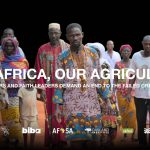Our Africa, Our Agriculture: African farmers and faith leaders demand an end to the failed Green Revolution
MEDIA CONTACTS
Anne Maina, Biodiversity and Biosafety Association of Kenya / anne.maina@bibakenya.org
Ferdinand Wafula, Bio Gardening Innovations / biogardeninginnov@yahoo.com
Leonida Odongo, Haki Nawiri Afrika / leonida@hakinawiriafrika.org
Anuradha Mittal, Oakland Institute / amittal@oaklandinstitute.org
Alliance for Food Sovereignty in Africa /kirubel.tadele@afsafrica.org
Gabriel Manyangadze, Southern African Faith Communities’ Environment Institute (SAFCEI) / gabriel@safcei.org.za
Ahead of the annual African Green Revolution Forum (AGRF), African civil society, faith groups and farmer leaders held a press conference on September 1 calling for an end to the failed Green Revolution. Speakers highlighted how the Alliance for a Green Revolution in Africa (AGRA) has pushed a development model that reinforces dependency on foreign inputs, such as expensive fertilizer, undermining the resilience of African food systems.
“We are calling upon all the funders to please stop funding AGRA. Redirect your funding towards systems that enable people to have their dignity, for all creation to have an equal chance to live, where there are no chemicals in our water, in our ground, and in our food.” —Gabriel Manyangadze, Climate Justice Coordinator at SAFCEI
Africa’s largest food producer networks and their allies demand a decisive shift away from imported fossil-fuel-based fertilizers and chemicals, and towards self-sufficient, ecological farming that revitalizes soil and protects ecosystems. These calls take place just before AGRA’s annual forum, from September 5-9, where corporate executives, governments and donors will gather in Kigali, Rwanda, claiming “Bold Action for Resilient Food Systems.” However, a united alliance representing the largest network of food producers and faith leaders in Africa made clear that the ‘bold action’ they want is for AGRA’s donors to stop funding an initiative that has failed to improve productivity, incomes, and food security. AGRA’s donors include the Gates Foundation, the Rockefeller Foundation, USAID, governments of the UK, Germany, and others.
Last year, over 200 organizations signed on to a letter from the Alliance for Food Sovereignty in Africa (AFSA). The letter demands that donors withdraw support from AGRA, a project that continues to disenfranchise the very farmers that they claim to support, and toward agroecological farming. To date, these donors (and AGRA) have yet to change course. The Alliance for Food Sovereignty in Africa is the largest civil society movement on the continent, bringing together farmers, pastoralists, fishers, Indigenous peoples, faith groups, women’s movements, youth and consumer associations in a united voice for food sovereignty. It is a network of networks operating in 50 African countries, representing 200 million people.
A recent donor-commissioned evaluation confirmed that AGRA has failed to increase farmers’ yields, incomes and food security. In fact, studies show that since AGRA’s founding, food insecurity has increased by 31 per cent in the countries in which AGRA operates. AGRA has failed to achieve maize yields in over half of the countries studied. Of all these countries, only farmers in Burkina Faso have experienced an increase in net maize sales. In addition, crop diversity has declined, and heavy agrochemical use has degraded soils. Nutritious, climate-resilient indigenous crops such as millet and sorghum have significantly fallen in production. The very few who AGRA can prove to havebenefitted were wealthy, larger-scale male farmers, not small-scale farmers or women.
AGRA’s Green Revolution model is even less viable today, with fertilizer prices at double or triple their levels than just two years ago. This shift has only enriched agrochemical multinationals with record profits while hunger in Africa has surged to alarming levels. The past Green Revolutions in India, Mexico and the Philippines have created similar problems: erasure of local food systems, high dependency on costly inputs, the resulting farmer suicides, and destruction of local ecologies.
“Given this background, it is shocking that a number of international donors continue to prioritize corporate profits over people, leaving the necessary transition to sustainable agroecological practices underfunded. Ignoring the opposition of millions of African farmers and the evidence that exists of sustainable ways to increase yields and improve livelihoods, the African Development Bank is using the food price crisis to expand the use of industrial inputs to the benefit of agrochemical and agribusiness firms.” — Anuradha Mittal, ExecutiveDirector of the Oakland Institute.
The Alliance for Food Sovereignty in Africa has its own answer to large increases in fertilizer prices: a network of 15farmer-managed centres across Africa producing bio-fertilizers and
bio-pesticides using low-cost, locally-available materials. Ample evidence and case studies on agroecology have led to widespread calls by farmers, civil society and U.N. agencies to transition towards these more sustainable models. These systems and practices demonstrably improve soil fertility, increase productivity with lower costs and higher incomes for farmers, while building climate resiliency.
“We have the expertise. The best people to solve problems in Africa are people from the continent itself. We need Afrocentric solutions. Our big question as African people is why should our problems be solved by entities outside the continent?” — Leonida Odongo, co-founder of Haki Nawiri Afrika.


































[…] or to African civil society’s demands that it change course, most recently articulated at a press conference on the eve of AGRA’s annual Green Revolution Forum. The rebranding may be more revealing, As […]
[…] of African people have demanded that the UK and others cease funding an agricultural initiative on the continent. They say that the Alliance for a Green Revolution in Africa (AGRA) locks farmers […]
[…] of African people have demanded that the UK and others cease funding an agricultural initiative on the continent. They say that the Alliance for a Green Revolution in Africa (AGRA) locks farmers […]
[…] of African people have demanded that the UK and others cease funding an agricultural initiative on the continent. They say that the Alliance for a Green Revolution in Africa (AGRA) locks farmers […]
[…] earlier this month, a group of regional civil society, farm and faith groups called on international donors, including in Germany, the Netherlands and the U.K., to defund the […]
[…] new five-year plan.But earlier this month, a group of regional civil society, farm and faith groups called on international donors, including in Germany, the Netherlands and the U.K., to defund the […]
[…] new five-year plan.But earlier this month, a group of regional civil society, farm and faith groups called on international donors, including in Germany, the Netherlands and the U.K., to defund the […]